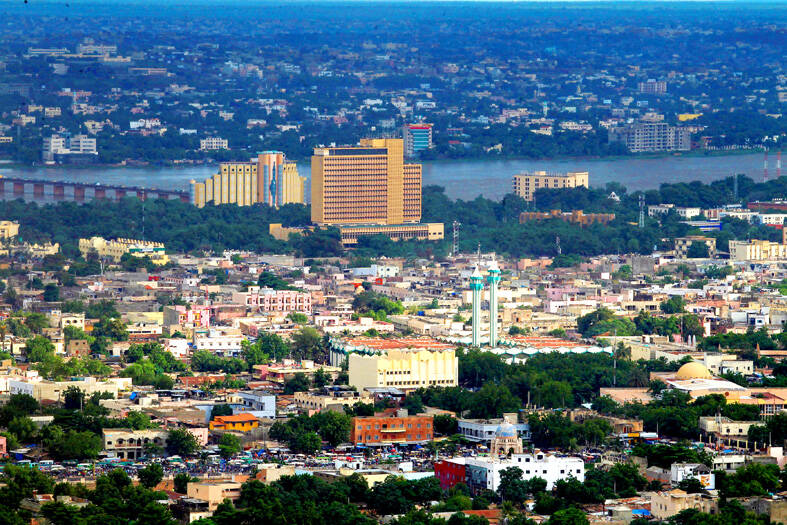Under a blazing sun in Mali’s capital, Amadou Menta leaned over to measure a gutter then jotted down the results on a mapping app on his smartphone.
“We’re collecting data,” said the 27-year-old geography student, helping to chart the roadside drains of central Bamako with two friends.
Until recently Mali’s capital was largely uncharted on the Web.

Photo: Reuters
With street names or fixed public transport routes often missing in the city of about 2 million, people tend to ask for directions to find their way, but the lack of maps is a major obstacle to developing its infrastructure — whether to prevent traffic jams, collect wastewater and garbage, or prevent flooding.
Tech-savvy young Malians are striving to change this, cataloguing the city’s features in the hope it will improve the lives of its residents.
Armed with smartphones, dozens of volunteers have been collecting data for the local branch of OpenStreetMap, a free, online geographic database — which is then used by sites including Google Maps.
Menta and fellow mappers have been charting the channels collecting waste and rainwater in Daoudabougou, a central district often hit by floods.
The gutter project is receiving financial support from the World Bank and has been welcomed by the authorities, but it is just one of the avenues the group is exploring — and there is plenty more work to do.
Founder Nathalie Sidibe said there was previously “no freely available data in Mali.”
“We saw mapping as a concrete way to contribute to developing the area,” she said. “We need to change habits here — and to do that, we need to encourage people to use digital tools.”
Mobile data access is still poor in Mali. Nationwide, only one in 10 women is connected to mobile broadband, compared with one in five men, a World Bank report found last year.
However, the OpenStreetMap Mali team has been busy.
So far, its volunteers have drawn up a map of Bamako’s public minibus routes, household waste collection points and basic social services.
Adama Konate, deputy mayor in charge of sanitation, said the group’s efforts had helped Bamako.
“We only had basic knowledge before this project,” Konate said. “Now we know that this place needs drainage and that place needs a rubbish dump.”
Mahamadou Wadidie, director of the Regional Development Agency in Bamako, said the youth mapping project had made his job much easier.
On the agency’s Web site, he showed off a regularly updated map of all the health centers and schools in Bamako drawn up from OpenStreetMap data.
“Instead of taking two months to find out about these things, mayors can now get this information from their computer,” he said. “Digitization is allowing us to get ahead, to lose less time.”
Mali — an impoverished nation with severe governance challenges that has been battling a decade-long jihadist insurgency — does not have many resources to devote to digitizing data, but Menta and his young colleagues have shown it is possible to launch ambitious mapping projects “without spending a lot of money,” Wadidie said.

POLITICAL PRISONERS VS DEPORTEES: Venezuela’s prosecutor’s office slammed the call by El Salvador’s leader, accusing him of crimes against humanity Salvadoran President Nayib Bukele on Sunday proposed carrying out a prisoner swap with Venezuela, suggesting he would exchange Venezuelan deportees from the US his government has kept imprisoned for what he called “political prisoners” in Venezuela. In a post on X, directed at Venezuelan President Nicolas Maduro, Bukele listed off a number of family members of high-level opposition figures in Venezuela, journalists and activists detained during the South American government’s electoral crackdown last year. “The only reason they are imprisoned is for having opposed you and your electoral fraud,” he wrote to Maduro. “However, I want to propose a humanitarian agreement that

ECONOMIC WORRIES: The ruling PAP faces voters amid concerns that the city-state faces the possibility of a recession and job losses amid Washington’s tariffs Singapore yesterday finalized contestants for its general election on Saturday next week, with the ruling People’s Action Party (PAP) fielding 32 new candidates in the biggest refresh of the party that has ruled the city-state since independence in 1965. The move follows a pledge by Singaporean Prime Minister Lawrence Wong (黃循財), who took office last year and assumed the PAP leadership, to “bring in new blood, new ideas and new energy” to steer the country of 6 million people. His latest shake-up beats that of predecessors Lee Hsien Loong (李顯龍) and Goh Chok Tong (吳作棟), who replaced 24 and 11 politicians respectively

Young women standing idly around a park in Tokyo’s west suggest that a giant statue of Godzilla is not the only attraction for a record number of foreign tourists. Their faces lit by the cold glow of their phones, the women lining Okubo Park are evidence that sex tourism has developed as a dark flipside to the bustling Kabukicho nightlife district. Increasing numbers of foreign men are flocking to the area after seeing videos on social media. One of the women said that the area near Kabukicho, where Godzilla rumbles and belches smoke atop a cinema, has become a “real

‘WATER WARFARE’: A Pakistani official called India’s suspension of a 65-year-old treaty on the sharing of waters from the Indus River ‘a cowardly, illegal move’ Pakistan yesterday canceled visas for Indian nationals, closed its airspace for all Indian-owned or operated airlines, and suspended all trade with India, including to and from any third country. The retaliatory measures follow India’s decision to suspend visas for Pakistani nationals in the aftermath of a deadly attack by shooters in Kashmir that killed 26 people, mostly tourists. The rare attack on civilians shocked and outraged India and prompted calls for action against their country’s archenemy, Pakistan. New Delhi did not publicly produce evidence connecting the attack to its neighbor, but said it had “cross-border” links to Pakistan. Pakistan denied any connection to